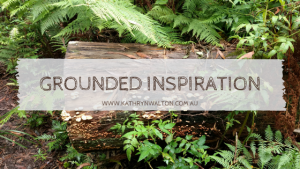“Find those snippets of your day where you can cultivate simplicity”
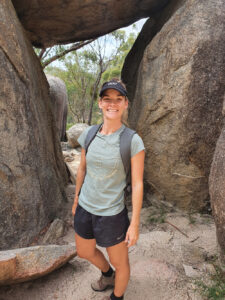
This is the transcript from Season 2, Episode 6 of the Outdoors is my Therapy Podcast with my friend Jessica Carey.
The Complex Simplicity of Nature
Kathryn: Hello and welcome back to The Outdoors is My Therapy podcast. I’m your host, Kathryn Walton. This is series two and in each episode you’ll get to meet one of my friends who’ll share what inspires them about the outdoors. Each episode is just a few minutes long, like a little snack of information and inspiration that feeds your mind and your heart and reconnects you with the therapeutic benefits of the outdoor world.
As humans living in the modern age, we are pretty used to being surrounded by buildings with roofs to shelter us from all weather – sun, rain, snow, hail, whatever. The walls of our buildings protect us from the wind, and I guess we’ve kind of learned to feel safe when we’re inside. We snuggle up into our cozy beds at nighttime, often with the windows closed to the natural world outside and having climate controlled conditions inside.
We have heating and cooling, lots of straight, smooth edges, evenly textured surfaces, and we’re surrounded by fabricated comforts and equipment. For many of us, we leave our homes in the morning and jump straight into a car or a train or a bus, and we aim to get the closest park possible or get off at the closest station possible to our school or our work.
So really, we separate ourselves from the very environment that both challenges and sustains us, and that has done so throughout human history. Without a doubt we’ve made incredible advances in technology that aid survival of the individual and survival of our whole human species. But in doing so, we also risk separating ourselves from those aspects of nature that support and nurture our very being.
The industrial age has gifted us with countless benefits, yet we’ve made many sacrifices as well. The human body, the human brain, and nervous system adapted to live in the natural world over tens or even hundreds of thousands of years.
Over the past 200 years, we’ve radically changed our living environment, but our bodies and brains need much longer than that to adapt to the changes that we’ve created in our surroundings.
Now, the natural environment, it’s not all about the tranquility, the peace, and the quiet. There’s much more to it than that. It’s also about the challenges, the risks, and the opportunities to stretch our skills and abilities, and our knowledge and understanding of the complexities of the systems in nature.
It’s also about our ability to tap into the simplicity of nature when we need it. The complex simplicity of nature. It may be an oxymoron, but as you’ll hear from today’s guest, it’s a reflection of human nature as well, and you too can find snippets of your day where you can connect with the complex simplicity of nature.
Jessica Carey is an all round inspiring soul with an infectious smile and laugh. She’s a deep thinker and a passionate nature lover. Jessica was one of our Outdoors is my Therapy Ambassadors when we first launched the initiative back in 2020, and you may have already heard her in Episode 30, Navigating Off Track, when we went a little bit cross country on a bushwalk together.
Jessica has also been a guest on my other podcast Speak Out Loud, Season 2, Episode 12, where she talked about movement and mindset, and particularly about the seasons and the cycles in nature, and how you can build your resilience to manage change. There’s a link to these episodes in the show notes, and I’m sure you’ll love to have a listen in to both of them.
But for now, meet my friend Jessica.
Welcome back to the podcast, Jessica.
Jessica: Thank you, Kathryn. It’s great to be here.
Kathryn: Jessica, what inspires you about nature?
Jessica: Well, that’s quite a loaded question, but what inspires me? Well, for me, nature is where we come from. So on a really big scale, it’s like when you turn and look at the trees or the sky, the grass, laying in the grass, the creek that we are beautifully sitting beside today, or whether it’s a beach or a mountaintop, it, um, I believe it reminds us where we come from and who we are. Uh, it may sound simple, but nature can be complicated and it can come with force or it can be, in a flow state, but it’s complex simplicity. And I think that’s a bit like human nature.
Kathryn: And that reminds me of, you know, some of those really hectic, chaotic days when things just seem really chaotic. How nice it is to just go outside and be with the simplicity of nature.
Jessica: Absolutely. And I think if you can find those snippets of your day where you can cultivate simplicity, and if that’s through watching a sunset or finding a mountain top, or putting your feet in the earth to ground, I think, they’re the moments we can cultivate to support chaos so we can become a more whole human.
Kathryn: Jessica, do you have a favourite space in the outdoors?
Jessica: Oh, a favourite one that’s pretty difficult. Uh, I like many spaces for many different reasons. For me, it depends on how I feel or if I need to let go or what I want to experience, but, mountains are my calling. I, I really appreciate valleys and wide open spaces. If I want to go to the top of a mountain, it’s about the journey there. But the top is, um, the pinnacle of being able to see things from a higher perspective, but then sometimes I let go in the ocean and being able to let go and cleanse and support myself in that. And I’m really wanting to go to the desert, to the red earth this year that’s been calling me at the moment, so I’m not sure what that’s gonna cultivate. But yeah, I believe there’s a different season and cycle that nature supports us in, in all aspects of our life.
Kathryn: Thanks for tuning into The Outdoors is My Therapy podcast. We hope you feel inspired to connect with the outdoors no matter how big or small your adventures might be. If you’re looking for more inspiration or you’d like to connect with others in the outdoors is my therapy community. Check the show notes for all the links.
You can listen to the episode “The Complex Simplicity of Nature” here:
You can listen to Jessica in Episode 30 “Navigating Off Track” here:
You can listen to “Movement and Mindset with Jessica Carey” in Season 2, Episode 12 of the Speak Out Loud podcast here.
LINKS
Contact Kathryn via her website
Grab your free Guide to a Perfect Nature Escape Day when you subscribe to the Grounded Inspiration newsletter (limited time)
Contact Jessica Carey
“Movement and Mindset with Jessica Carey” – Transcript from the podcast “Speak Out Loud: Stories of Strength from the Southern Downs” Season 2: Episode 12 (Published 4th April 2022)
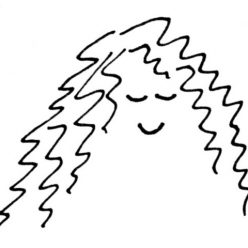
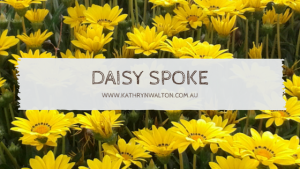
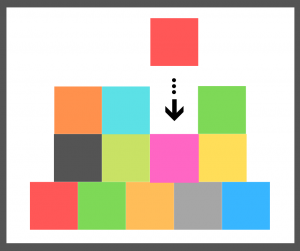

 make the best ‘recipe’ for resilience and happiness – our world is full of distractions and quick-fix ideas. So, here I’d like to offer you some of the action-based ingredients that stand out through the ages and in all parts of world, and that are now backed up by rigorous research. In the next blog I’ll outline some of the very powerful mind-based strategies you can add to your mix to really step into your strength.
make the best ‘recipe’ for resilience and happiness – our world is full of distractions and quick-fix ideas. So, here I’d like to offer you some of the action-based ingredients that stand out through the ages and in all parts of world, and that are now backed up by rigorous research. In the next blog I’ll outline some of the very powerful mind-based strategies you can add to your mix to really step into your strength.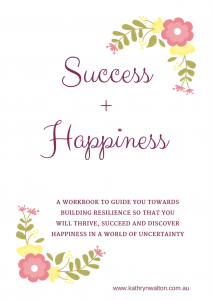 I have an EXCITING OFFER for you!
I have an EXCITING OFFER for you!